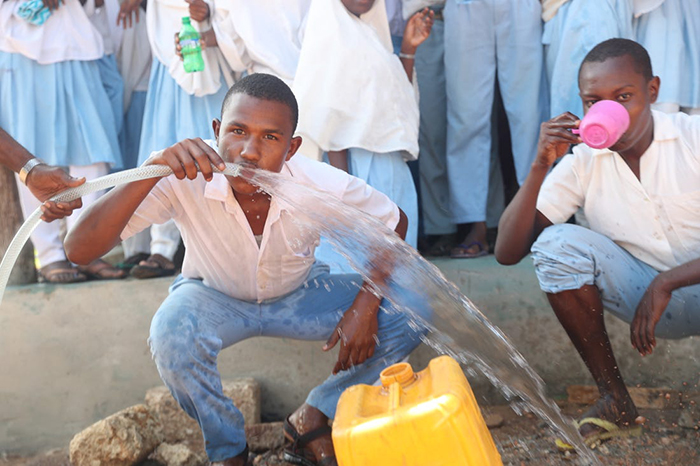- About
- Topics
- Picks
- Audio
- Story
- In-Depth
- Opinion
- News
- Donate
-
Signup for our newsletterOur Editors' Best Picks.Send
Read, Debate: Engage.
| October 01, 2018 | |
|---|---|
| topic: | Health and Sanitation |
| tags: | #cholera, #sanitation, #Zimbabwe, #water, #human rights |
| located: | Zimbabwe |
| by: | Cyril Zenda |
Zimbabwe is currently in the throes of yet another cholera outbreak that has so far killed more than 49 people and infected over 7,000 others. The latest cholera outbreak is the third this year, in addition to two typhoid outbreaks.
So bad are the water and sanitation conditions in Zimbabwe that it is not unusual to come across half of a classroom of teenage children who were born, and have lived all their lives, in the capital city, Harare, but have either never opened a water tape or used a flushing toilet, if not both. This is because water supplies in most of the country’s urban areas are at best erratic and at worst non-existent. The City of Harare can only supply water to 45 percent of its residents, leaving the others to depend on unsafe water sources that include thoroughly contaminated boreholes.
The country’s president, Emmerson Mnangagwa, has admitted that the country lost nearly two decades of infrastructural development.
Findings by Human Rights Watch (HRW) which are contained in a 2013 report titled “Troubled Water: Burst Pipes, Contaminated Wells, and Open Defecation in Zimbabwe’s Capital,” painted a gloomy picture about the water and sanitation situation in the southern African country. The 60-page report described how limited access to potable water and sanitation services was forcing citizens to resort to using water from unprotected sources and other unhygienic practices such as open defecation.
“We have one toilet for the whole house and there are 21 people who live here,” one mother in Harare said in the damning report as she described the gravity of the water and sanitation crisis they face. “The flushing system doesn’t work because there is no water, so we have to use buckets. When there isn’t any water for flushing, we just use the bush.”
According to the United Nations Children’s Fund (UNICEF) poor water, sanitation and hygiene (WASH), including garbage management, directly and indirectly cause infant (under-five) and maternal deaths worldwide and also affect the health of older children and adults.
“The collapse of water revenues from the late 1990s led to a decline in all WASH infrastructure and services, including water resources development and management in all parts of the country,” UNICEF said in a report.
Dirty Politics
The country’s water and sanitation woes appear to have been exacerbated by the to dirty politics for the tussle for control of urban areas between the ruling party and the opposition. Since the year 2000 when a serious opposition emerged in the form of the Movement for Democratic Change (MDC) the ruling ZANU-PF party lost control of all the country’s major towns and cities and has been battling retain control through populist, but detrimental, tactics. In the run-up to the 2013 elections, former president Robert Mugabe cancelled all residents’ bills opposition-controlled local authorities, thereby financially hamstringing their operations. Former Harare mayor (2013-2018) Bernard Manyenyeni has always pointed out that the already financially crippled capital city never fully recovered from this devastating blow. The move also fostered a culture of not residents not paying their municipal bills so that by August 2018, the city was owed nearly $800 million in unpaid bills, making its duty of providing water and other sanitation services near-impossible.
The ruling party has promoted parallel developments in most urban areas by parcelling out state-land as residential stands, especially around Harare, leading to the mushrooming of unplanned settlements, without water and sewerage reticulation systems.
However, since the latest cholera outbreak, there has been unusual cooperation between stakeholders from across the political divide, with President Mnangagwa’s government leading efforts to mobilise resources to ensure that the water and sanitation situation is addressed in a holistic way.
This comes at a time when Zimbabwe has just started to benefit from the “Cities of the Future” programme, an initiative of the Africa Water Facility (AWF) together with global development partners that include the African Development Bank (ADB) and Global Water Partnership (GWP).
Marondera – a town of 65,000 people some 75 km from the capital – was chosen to receive the support of the development partners in the establishment of an integrated water and sanitation master plan that would become a model for the whole country.
Project engineer, Thami Mpala, said the Marondera pilot project is the first of its kind in the country, where they are developing nature-based solutions by managing resources in a sustainable and integrated way.
“The Marondera Integrated Urban Water Management (IUWM) master plan is a project that involves the rehabilitation of water and sewer infrastructure within Marondera and also provides innovative plans for the smart management of water resources through adopting an integrated approach where nature-based solutions are used,” Mpala said.
The project has received €2.3million (US$2.6 million) from ADB, the government of Zimbabwe and GWP.
“The integrated approach looks at water, stormwater, waste-water, and solid waste holistically, whilst also facilitating institutions and fostering stakeholder engagement,” Mpala added.
The project is a direct response to the findings of HRW whose report recommended that the government takes steps in ensuring access to water and sanitation facilities by all citizens through investing in low-cost sanitation and water strategies, implementation of a sliding fee scale for municipal water and an end to water disconnections in cases of non-payment of bills.
By copying the embed code below, you agree to adhere to our republishing guidelines.
